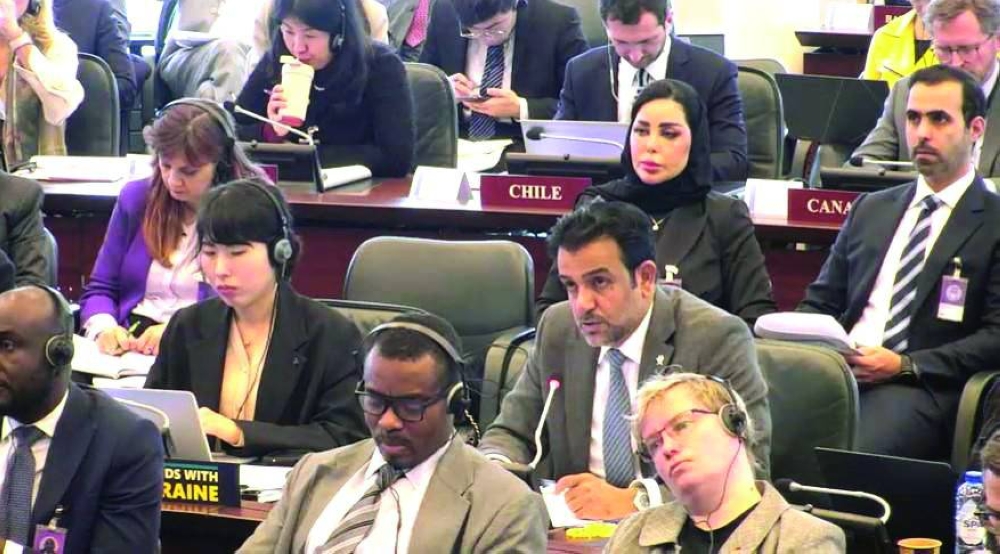Qatar participated in the 105th session of the Executive Council of the Organization for the Prohibition of Chemical Weapons (OPCW), held in The Hague. Ambassador of Qatar to the Netherlands, and Representative of the State of Qatar to the OPCW HE Dr Mutlaq bin Majed al-Qahtani headed Qatar's delegation and the session.
Delivering the State of Qatar's speech, HE al-Qahtani said that the OPCW and its Executive Council are an important tool and must be effective in achieving international peace and security. Therefore, the organization and its Director-General have a great responsibility of carrying out their main role in monitoring and ensuring that states implement their obligations in accordance with the Chemical Weapons Convention and the relevant conventions and resolutions of the Organization.
He voiced Qatar's strong condemnation of the use of chemical substances and weapons by any party, states or non-state actors, under any circumstances, affirming Qatar's support for the efforts of the organization and its investigation mechanisms in continuing their work for a world free of the chemical threat. He pointed out that at a time when the members of the organization are meeting to work together for a world free of chemical weapons, Israel is waging a brutal war on Gaza in flagrant violation of international law and is using prohibited materials in its aggression against the defenseless Palestinian people, including its use of chemical materials prohibited by the Chemical Weapons Convention and other relevant conventions.
Israel's failure to join the Chemical Weapons Convention does not mean that it has the right to violate the principles and rules of international law that prohibit the use of this type of weapons, he stressed. HE al-Qahtani affirmed Qatar's support for the State of Palestine's request submitted to the organization's secretariat to investigate Israel's use or threats of use of chemical weapons and other prohibited materials under international disarmament conventions and international law. He stressed that the organization, the Executive Council, and the Director-General must have a more effective role in stopping the cycle of violence and destruction caused by the Israeli arsenal against the Palestinian people.
The continuation of the Israeli aggression against Gaza will have serious repercussions on international peace and security and will create certain conditions for the spread of terrorism, violence and extremism and the expansion of the circle of fighting. Therefore, he said, it is in the interest of all to stop this war, hold the perpetrators of these serious international crimes accountable, and ensure that they do not escape punishment.
HE al-Qahtani highlighted that after reviewing the fourth report of the Investigation and Identification Team (IIT) of OPCW and its conclusion that there are reasonable grounds to believe that ISIS was the perpetrator of the chemical weapons attack on September 1, 2015 in Mare, Syria, Qatar looks forward to further discussion on the reasons and ways ISIS obtained these chemical weapons, explaining that the use of chemical weapons by non-state actors has become a reality that must be addressed.
From this standpoint, he called on the Syrian regime to cooperate with the organization and its technical teams to fulfill its obligations in accordance with the Chemical Weapons Convention and the relevant Council resolutions.
He also noted the importance of strengthening international and regional efforts in combating terrorism, and preventing the spread and use of this type of weapon by terrorist groups, through exchanging intelligence and technical information, building national and regional capacities, strengthening the role of law enforcement agencies including border security, cooperating with other actors in the context of combating terrorism, and cooperating with the Organization for the Prohibition of Chemical Weapons.
In conclusion, HE al-Qahtani voiced Qatar's keenness on co-operation with OPCW within the framework of Article 10 of the Convention in providing training and assistance to states parties in Asia and the rest of the world through the Doha Regional Center for Training on Conventions Related to Weapons of Mass Destruction, to implement programs related to combating chemical weapons and providing protection from their danger, expressing Qatar's aspiration for further co-operation with the organization and member states in order to achieve common interests and goals.

